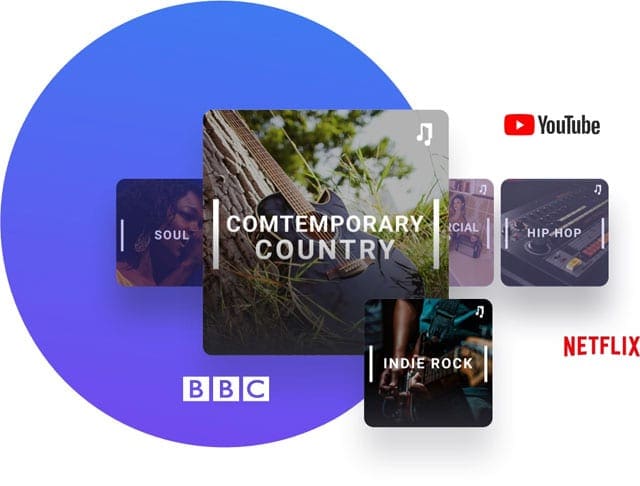Who are they and what do they do?
Music has the power to make or break a key moment in a film, TV show, video game or advert. Imagine some of the most iconic moments in cinematic history without the music to reinforce the significance of the moment. How different would Kate Winslet and Leonardo Dicaprio’s scene on the front deck of the Titanic have been without the music?
Scores and soundtracks add impact and memorability to cinema, they have the power to intensify suspense, heighten emotion and unsettle the viewer.
Who are music composers and what do they do exactly?
The role of a music composer is to write the musical scores that accompany moving images. Their scores have to reflect the tone of the scenes within the film, TV show, video game or advert. A good music composer will deliver a musical score in that fits the director’s vision.
While composers strive to work on big-budget, high profile film projects, in reality, their work can be extremely varied. It can take years to build up a strong portfolio and reputation that will attract the directors in Hollywood to your work. In the meantime, you may find yourself working on theatre orchestrations, TV, video games, radio, advertising, art installations or in education.
Music composers generally work on a freelance basis, depending on the scale of their commissions, they often have another job as a more steady form of income.
Training and education
Although qualifications are not required to go into this field, it is considered an advantage to have had significant training in music theory and musical scoring. It goes without saying that musical talent is a fundamental requirement music composing who often have experience as performing musicians or conductors. Technical knowledge of composition and how certain instruments complement each other’s sound are all necessary skills. This kind of technical understanding is usually achieved through some degree of schooling or graduate course.
University-level education can also aid you with technical training, as the industry has evolved with the development of new technology. Composing and producing software can drastically speed the process of composition, which in turn has resulted in tighter deadlines and more demanding turnarounds from directors.
Who hires you? Players in the industry.
As a music composer, you could work with a variety of players within the world of scoring and sync. Each relationship will be different; you may be scouted by, or alternatively, have to seek out each of these players in order to have your music placed alongside film.
Directors and Producers
Whether it’s a student film, an independent film, or a Hollywood blockbuster, it’s likely you’ll work with directors and producers. Most film scoring occurs after the first edit of the movie or episode for TV. Once the video editor has arranged the pieces of film in sequence, they will commission you to fill in the background.
In these circumstances, your success will be determined by your ability to fulfil the wants of the director. Regardless of the scale or budget of the project, if you fail to give the director what they want, chances are you’ll be fired. Even if you produce the most breathtaking piece of score, if it’s not appropriate it won’t be used.
Music Supervisors
Often a music supervisor will source the scores for TV shows or film, saving the director time to focus on the picture. Music supervisors usually have an array of contacts within the music industry that they might turn to based on past projects and reputation. They understand the needs of the director and are trusted to find the right song composer for the job.
You can approach music supervisors as an independent, introducing yourself in the hope of future work or if you know their current project. Find their contact information, tailor your approach and be relevant. Don’t waste your time or theirs by sending across music that is not relevant or of interest to them.
Music Editors, Recording Mixers and Sound Designers
These are the people who place your music to the film, tweak your compositions so that they sync with the other elements of audio within the video. They will often act as a communicator between the director or producers and the music composer, informing them of any changes or issues in regard to the score.
Musicians
Depending on the scale of the project, you may work independently when developing your scores, or you could work with a selection of musicians whilst writing or producing the final product. If you possess the instrumental skills required to write the score, you could do it alone. If you compose multi-layered scores with a full orchestra or are working closely with the director, it could be that you need to hire musicians to produce the score.
Career – Starting out to the big leagues
Like many music jobs, it’s rarely a smooth journey. When you’re starting out you need experience; talent alone is not proof of ability. Many begin their careers with composing bringing in little or no income, working on small projects or student films, whilst also working another job to pay their bills.
You will put in a lot of work for a seemingly little outcome, but building up a portfolio will generate more opportunities and hopefully more revenue.
Even once your work has become more lucrative, employment may still be sporadic and low paying. As your career progresses, you will have to work tactically to keep your trajectory moving upwards. As you rise higher, so do the stakes. Big composers such as John Williams can charge up to $2 million per pictures, but that’s not necessarily achievable, especially without a legendary reputation and years of experience in Hollywood.
Key Skills
Flexibility
It is widely commented by music composers, that a flexible approach and attitude are vital to success. During the editing phase after all the filming is complete, scenes are constantly rearranged or edited, and therefore so will your score. A stubborn approach to your artistic vision is not going to go down well with the director. The vision belongs to them alone. You must be flexible in order to adapt your score to the development of the final picture.
People Skills
Keeping directors and music supervisors happy is a must in this business. They are often freelance and so you must ensure a good working relationship with important and influential colleagues if you’re hoping to work together again in the future. As your own boss and agent, networking is vital to finding work.
Speed
Due to the advancement of musical composition software, deadlines set by directors for film scores have become a lot tighter. As cuts are made constantly during the editing process, a music composer must be able to write scores incredibly quickly and with the same poignancy. Composers may be asked to produce over an hours worth of score, if you can’t do it quickly the director will find someone who can.
Versatility
Music composers can be asked to write for a variety of music genres (folk, rock, pop, hip hop, classical, string quartet) and briefs, the video games industry is a very different client base as to theatrical arts. Employment can be sporadic and hard to come by depending on what stage you’re at in your career.
To earn your living, versatility is an important skill. Not every brief will be the same, and not every director, supervisor, an editor will want the same score. Adaptability demonstrates your skill as a composer and will attract potential employers.
Composing software and technology
Music notation software and technology is now used widely across the industry, as it can provide composers with useful tools which speed up the scoring process. If you’re starting out you’ll want to set yourself up with a composing area, moving to a more high-quality studio when you need to expand your operations.
Most start with a computer, using some sort of music composer app software, and a MIDI keyboard.
As with any piece of technology, you have to choose the best option for you. Depending on the end placement of your score, or your personal creative process, different programmes may work better for you. There are a number of free software packages available via the internet, as well as advanced services which you’ll have to pay for.
Musescore is a popular free composing software package available for Windows and Mac, which allows you to write for a wide selection of instruments with an easy to use, high-quality service. Noteflight allows you to compose music online to sell your edited versions of copyrighted songs, as well as write your own scores.
At the other end of the scale, there are programmes like Sibelius, who offer more professional software packages, which require purchase or subscription. Notion 6 by PreSonus is a music composer app for PC as well as Mac and iPad.
As well as using technology to write scores, it’s widely suggested that your skills as a producer are just as important as your skills as a music composer. Being able to mix your compositions is vital, throughout your developmental stages, you might not have access to musicians or the time to rerecord the whole score. Mixing and editing the elements of your score is a universal and necessary skill.
Composing for score (Film + TV)
If film and TV is the way you want to take your career, composing music per project, specific to the visual, then here’s what you’ll need to do. Start small, working on independent films or student projects, potentially for no pay, to build up your portfolio. As you begin to move up and the jobs get bigger so will your pay grade, but you have to start somewhere.
The composition process usually begins in a studio, using a MIDI or software library of virtual instruments to record the initial score, then they may take it to another studio to produce the final score and touch-ups. Big budget films will often record the score with live instruments in a studio.
To compose for film and TV, you should not only be musically talented but have a love of TV and cinema. As we’ve already discussed, you will be required to work closely with the director or producer. If you do not capture their vision for the picture or misinterpret the moment on the screen, then you won’t be keeping your job.
Most directors want a score that is unnoticed, that is a part of the picture itself, blending into the background and not distracting from the moment on screen. Others, however, may want something that adds to the atmosphere and helps draw the viewer in, think horror films. One of the most important skills you will need to be a film composer will be to understand what the director wants, and deliver it to them.
Composing for production music
Writing production music can be a good starting point. Composing production music involves writing music for TV, adverts or any other form of visual media, but without a brief. Composers create their tracks, upload them to Production Music Libraries who control the licensing, then get paid when they are used. In these cases, the music writer gets paid upon the agreement they have previously established with the production library.
Production music libraries generally need a broad mix and ready supply of music, spanning across genres, as their clients could vary drastically. Music sourced from production music libraries can be used in film, TV, advertising, video games and more. The licensing arrangements in production music allow a track to be used more than once, and so songs can bring in money if and when they are used in syncs.
The appeal of music libraries for music supervisors and advertisers is that they have a vast array of online music to choose from for their project. They didn’t deal with companies and artists fighting for their attention, it’s all there waiting for them.
When writing for music libraries, you need to ensure the tracks are ready to be used in sync immediately. This is no place for demos. The music supervisor looking for a track that is ready to go into the film, they’re not going to wait for you to re-record it. Make sure any music you publish to a music library is produced to professional quality.
Life on the job
As we’ve already established this is not an easy job; it’s an uncertain road and in no way smooth. You will have to work hard at your music, potentially seek higher education to develop your knowledge and skills, as well as working hard to establish yourself.
You may spend a lot of time working alone in your studio at home, but your people skills will need to be excellent too. In this industry, you are your own manager and employee, you’ll have to network to secure work and adhere to deadlines to keep it. This is not a regular office job, your hours can vary depending on your schedule and the project. You may be required to travel or liaise with your employers, again, it depends on the project.
This job is a labour of love, it’s not necessarily a stable career path and it requires a lot of motivation to work the hours that you do and under tight deadlines. You will have to seek out your own work, don’t wait for people to come to you. There are plenty of people online advertising for music composer jobs, and you will have to skillfully pitch yourself to them. Think about the project, what they want and what you can offer them.
When you reach out to people, make sure there is somewhere they can easily find you. Set yourself up with a professional, website with somewhere people can listen to your tracks and view your past work. Draw traffic to your website and feature a way to contact you should anyone find your site while looking online.
Salary
There is no clear answer we can give as to a music composer salary. If you search for salary estimates online, chances are they won’t be very accurate and will take an average that isn’t representative of the truth.
When you begin your music career, you’ll need quantifiable experience to demonstrate your skill. Working on student films and modest productions may not bring in a lot of money if any, so be prepared for long hours and little pay. It’s likely you’ll have an unrelated job that pays the bills but allows you the time to concentrate on your real passion.
Even once things begin to take off, a consistent paycheck cannot be expected. With all freelance work, you don’t know when the next project will come along. Even if your dream is to compose for film and TV, it might be worth dabbling in music libraries as they can bring in extra income to help tide you over between projects.
We don’t want to paint a picture of doom and gloom. If you work hard and people like your work, there is every chance you can make a successful career for yourself and make good money from it. Just don’t anticipate it to be an easy ride to fame and fortune.
If you’re a looking for a project or looking to create music or build networks, sign up to Music Gateway and join in the conversation on our community forum.
FAQ Section
Q: What is the difference between a musician and a composer?
The key difference between a musician and a composer is that a musician is a person who plays a musical instrument and in most cases can read sheet music. Whereas a music composer is someone who writes (composes) the music, which includes the arrangement, musical parts, chord progressions and harmonies. It’s common that a composer will likely play a musical instrument on which they would compose, such as a piano or guitar for example. It is most likely that a musician is also a composer.
Q: How much does a music composer make?
A music composer and arranger is estimated to earn between $40,000 and $60,000 a year depending on their experience and business network.
Q: What is the work of music composer?
Work for a composer is someone who writes music and can include the direction of original music used to produce various types of media entertainment. A music composer can write and create a TV or film score that is then performed by a multitude of musicians, choruses, or instrumental music ensembles.
Q: What degree do you need to be a music composer?
If you are considering a career in music and as a composer, you may need a bachelor’s or master’s degree. However, you will also need years of training and practice in the marketplace, especially for performance experience is essential and you should be competent with at least one musical form instrument.
Q: How much should I charge to compose music?
Session musicians charge on an hourly basis, which should also include a minimum number of hours, regardless of the total sessions hours you actually work. The rates usually run from $75 to $300 per hour. Composers working on an original score for big production films and TV programs will, of course, be earning considerable amounts and normally have an agent handling the negotiations. It’s been reported that Hollywood composers like Hans Zimmer are able to charge over $1 million for a decent budget film score.
Q: Who is the most famous composer of all time?
Here is a list of some of the most famous classical music composers of all time.
- Antonio Vivaldi 1678-1741
- Johann Sebastian Bach 1685-1750
- George Frideric Handel 1685-1759
- Franz Joseph Haydn 1732-1809
- Wolfgang Amadeus Mozart 1756-1791
- Ludwig Van Beethoven 1170-1827
- Frederic Chopin 1810-1849
- Giuseppe Verdi 1813-1901
Q: What’s the difference between a composer and an arranger?
What is the difference between being a musical composer and being a musical arranger? A music composer will create and write (compose) the original melody and harmony of a piece of music and the arranger will take the composition and work through the melody, harmony, bass lines and rhythm of the music and pair it with the intended ensemble. In a lot of cases, the composer and arranger are the same people.
Q: Do music arrangers get royalties?
The rewards of an arranging career are limited. Arrangers are paid on a work for hire basis and fees aren’t huge. Arrangers can receive royalties, but only if they write an original arrangement at the point the music is composed or if it’s a new arrangement of a public-domain composition.
Q: What is the difference between music director and composer?
A music director is responsible for directing the performance of the music and musicians. They may well be in charge of having music rewritten or sections removed depending on the project, such as a theatrical play for example. Whereas a composer is a person who writes music and will, therefore, earn royalties for any public broadcast of that music. The Music Director is also known as the conductor of an orchestra.
Q: What is the difference between music producer and composer?
There are two main types of music producers, one is someone that is hiring (paid) to produce a recording on behalf of a client, such as a record label or recording artist. The other type of producer is writing and creating their own beats and music, self-produced. Whereas music composing or songwriting is writing original music, melody or lyrics for a song. It’s common especially in hip hop, that the producer is also the person composing the music.



































